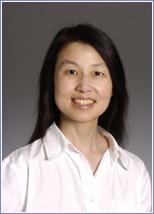|
 
Jeannette M. Wing
Computer Science Department Head,
Carnegie Mellon University
Dr. Jeannette M. Wing is the President's Professor of Computer Science and the Head of the Computer Science Department at Carnegie Mellon University . She received her S.B. and S.M. degrees in Electrical Engineering and Computer Science in 1979 and her Ph.D. degree in Computer Science in 1983, all from the Massachusetts Institute of Technology.
Professor Wing's general research interests are in the areas of specification and verification, concurrent and distributed systems, and programming languages. Her current focus is on design and measurement techniques for improving the security of software systems.
Professor Wing has contributed to eleven book or book chapters, and has published 85 refereed journal, conference, and workshop papers. She has given over 180 invited, keynote, or distinguished lectures at conferences, universities, and research institutions internationally. She was or is on the editorial board of eight journals.
Professor Wing is the chair of the National Academies of Sciences Computer Science and Telecommunications Board. She is a member of Microsoft's Trustworthy Computing Academic Advisory Board, the Intel Research Pittsburgh's Advisory Board, Dartmouth 's Institute for Security Technology Studies Advisory Committee, and the Idaho National Laboratory and Homeland Security Strategic Advisory Committee. She was a member of the DARPA Information Science and Technology (ISAT) Board and the National Science Foundation Scientific Advisory Board. She is a member of the Sloan Research Fellowships Program Committee. She was on the Computer Science faculty at the University of Southern California . At Carnegie Mellon, before becoming Department Head she was the Associate Department Head for the Ph.D. Program in Computer Science for nine years and the Associate Dean for Academic Affairs in the School of Computer Science for five years. She has worked at Bell Laboratories, USC/Information Sciences Institute, and Xerox Palo Alto Research Laboratories. She spent a sabbatical at MIT in 1992 and at Microsoft Research 2002-2003. She has consulted for Digital Equipment Corporation, the Mellon Institute (Carnegie Mellon Research Institute), System Development Corporation, and the Jet Propulsion Laboratory. She is a member of AAAS, ACM, IEEE, Sigma Xi, Phi Beta Kappa, Tau Beta Pi, and Eta Kappa Nu. Professor Wing is an ACM Fellow and an IEEE Fellow.

Predictable Software
The systems we build today continue to grow in complexity: in sheer size and functionality; over time, in terms of how often, rapidly, and disruptively they change; over space, in terms of where components reside and how services are distributed; over platform, in terms of diversity in device technologies to interface. The software that makes up these systems will be hard to circumscribe, hard to pin down (some pieces are ephemeral and elusive), and hard to assign responsibility to (untrusted versus certified code). Moreover, these software systems will be integrated to provide some set of end services to the customer. Software will be everywhere and touch everyone.
What behavioral properties of these complex software systems should we expect and can we measure? Traditional measures of correctness and performance are inadequate. After all, a result from a Google search query is not exact or complete, but it is generally "good enough". On the other hand, ˇ°good enough'' for search engines is not at all "good enough" for embedded medical devices.
In my talk, I will paint a vision for software systems of the future and then home in on one desirable behavioral property: predictability. Predictability necessitates building a model of the system and then asking it questions to determine whether good or bad behavior will result. I will discuss one way to achieve some degree of predictability for software: lightweight formal methods. I will illustrate recent successes in lightweight formal methods across a diverse range of applications and pose the technical challenges for the research community to overcome toward achieving a goal of predictable software.
|
